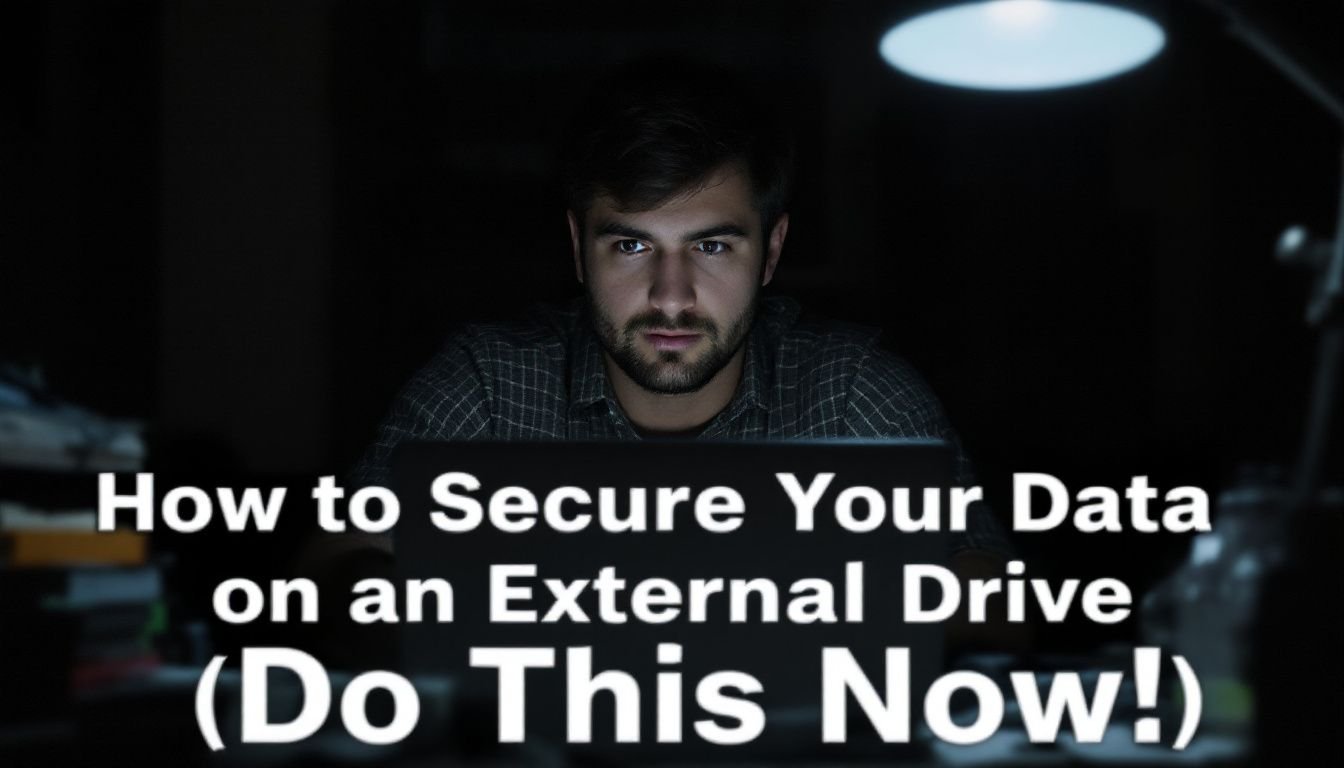How to Secure Your Data on an External Hard Drive (Do This Now!)

Keeping your data secure on an external hard drive is vital. Every day, valuable information gets lost or stolen. This article will show you how to protect your files with encryption and other steps.
Read on to learn more!
Key Takeaways
- Encrypting your external hard drive is crucial for protecting sensitive data from unauthorized access. Use third-party software, hardware-based encryption, or drives with built-in features to secure your files.
- Follow the 3-2-1 backup strategy: keep three copies of your data on two different types of media, with one stored offsite. Regular updates and tests ensure backups are reliable.
- Stay organized by deleting unnecessary duplicates and keeping track of what’s on your external hard drive. This reduces risks and keeps important information accessible.
- Prepare for potential drive failures by regularly backing up files and familiarizing yourself with recovery options. This minimizes data loss risks.
- Keeping your external hard drive’s software updated enhances security against vulnerabilities. Use antivirus programs to scan the drive regularly for additional safety measures.
Understanding Encryption

Encryption transforms your data into a secret code. This process keeps your information safe from unauthorized access and potential threats.
What is encryption? Encryption transforms information into a code. This process keeps your data safe from unauthorized access. Only those with the right key can decode it. Imagine sending a secret message that only your friend can read.
Encryption transforms information into a code. This process keeps your data safe from unauthorized access. Only those with the right key can decode it. Imagine sending a secret message that only your friend can read.
Using encryption on external storage devices protects sensitive files. Data security becomes much stronger this way. For example, if someone steals your external hard drive, they will struggle to access your data without the password or key needed for decryption.
This extra layer of protection helps keep personal and professional information confidential in an age where cybersecurity threats are common.
Why should you encrypt your hard drive? Data security matters more than ever. Encrypting your hard drive protects sensitive files from unauthorized access. Without encryption, anyone who gains physical access to your external hard drive can easily view your data.
Data security matters more than ever. Encrypting your hard drive protects sensitive files from unauthorized access. Without encryption, anyone who gains physical access to your external hard drive can easily view your data.
Strong passwords and encryption methods create a secure storage solution for personal or business information.
Encrypting also shields you against potential threats like theft or loss. In 2022 alone, nearly 700 million records were compromised due to insufficient protection measures. By using file encryption and hardware encryption techniques, you enhance data privacy significantly.
Secure storage practices not only protect files but also maintain peace of mind in our digital lives.
Methods for Encrypting Your External Hard Drive

You can choose from several methods to encrypt your external hard drive. Explore third-party encryption software, hardware-based options, or drives that come with built-in encryption features.
Using third-party encryption software
Third-party encryption software offers a strong way to protect your data. Programs like VeraCrypt and BitLocker encrypt files on your external hard drive. They secure your sensitive information with strong passwords, ensuring only you or authorized users can access it.
These tools often provide user-friendly interfaces. You can easily set up folders as encrypted containers for extra security. Regularly updating the software keeps your device security intact and protects against vulnerabilities.
Using third-party encryption is essential for effective data protection now more than ever.
Utilizing hardware-based encryption
Hardware-based encryption provides strong protection for your external hard drive. This method automatically encrypts data as you save it. It uses specialized chips to secure files without needing extra software.
Many modern external drives come with built-in encryption features, making it easy to protect your information.
Choosing hardware that supports this feature enhances mobile device security as well. These drives can safeguard sensitive data from unauthorized access very effectively and reduce the risk of losing critical information due to theft or loss.
Next, we will discuss methods for implementing best practices in keeping your data secure.
Using hardware with built-in encryption
Using hardware with built-in encryption offers strong protection for your data. Many external hard drives come equipped with this feature. This ensures your files stay secure without needing extra software.
You can set a password to access the drive, adding another layer of safety. With built-in encryption, you create a barrier against unauthorized access.
Choose devices from reputable brands known for secure data storage. They often follow strict security protocols to protect your information. Regularly update any required software to keep everything running smoothly.
Being proactive helps prevent potential security breaches and protects your files effectively.
Best Practices for Keeping Your Data Secure

Keep your files organized and clean to avoid confusion later. Regularly check what’s stored on your external hard drive and delete any unnecessary duplicates.
Implementing 3-2-1 backup strategy
A solid backup strategy helps protect your files from loss. The 3-2-1 rule stands out as an effective method.
- Keep three total copies of your data. This includes your original files and two backups.
- Store the copies on two different media types. Use an external hard drive as one option and consider cloud storage for the second.
- Maintain one backup offsite. This reduces the risk if a disaster strikes at your home, like a fire or flood.
- Regularly update your backups. Schedule these updates to ensure that recent files stay protected.
- Delete old backups when you make new ones. This practice helps save space and keeps things organized.
- Test your backups occasionally. Check if you can access files easily from both sources to confirm their integrity.
- Plan for emergencies by keeping essential software ready for quick recovery after data loss.
This strategy reinforces password protection and data backup effectively, ensuring that you remain secure while protecting files on your external hard drive.
Keeping your drive clean and updated
Keeping your drive clean and updated boosts file protection. It also helps maintain its performance over time.
- Regularly delete files you no longer need. This frees up space and reduces the chance of losing important data among clutter.
- Install updates for your encryption software. These updates often contain security fixes that protect your data more effectively.
- Use a reliable antivirus program to scan the drive. Malware can compromise your files, so staying proactive keeps your data secure.
- Organize files into folders and label them clearly. A well-organized drive prevents confusion and makes it easier to find critical documents quickly.
- Check for any corrupted files regularly. Identifying these issues early can save you from losing valuable information down the line.
- Create a schedule for regular maintenance on your external hard drive. Consistency ensures you are always protecting your data effectively and keeping everything running smoothly.
Being aware of what’s on your external hard drive
Keeping track of what’s on your external hard drive is crucial. Regularly check the files you have stored there. Unused files can take up space and may hold sensitive information that you do not need.
Take time to organize your data. Label folders clearly so you can find things quickly.
Delete any unnecessary duplicates or outdated files to keep things tidy. This process not only frees up storage but also reduces potential risks. Knowing what resides on your drive helps in managing it better.
Being aware of these items lays the groundwork for effective encryption methods that protect your data from unwanted access.
Deleting unnecessary duplicates
Deleting unnecessary duplicates helps keep your external hard drive organized. Many people unknowingly save the same files multiple times. This clutter takes up valuable space and can confuse you later.
You might find that some files are old or irrelevant. Take time to go through your drive and remove these copies. You will streamline access to your important data. A clean drive offers better performance and security.
Cleaning out duplicates aids in securing your data on an external hard drive effectively. Understanding encryption is the next crucial step for protecting your information.
Preparing for drive failures
Drive failures can happen unexpectedly. Preparing for them increases your chances of recovering important data. Regularly back up your files to a reliable cloud service or another external drive.
Following the 3-2-1 backup strategy helps keep your information safe.
Testing your backups ensures you can access them when needed. Familiarize yourself with recovery software as well. This knowledge will help secure your data on an external hard drive and ease the stress of potential losses.
Take action now to protect what matters most!
Conclusion

Securing your data on an external hard drive is essential. Use encryption methods to protect your information. Regularly back up your files using the 3-2-1 strategy. Keep your drive clean and know what’s stored on it.
Take action now to safeguard your valuable data!
FAQs
1. What does it mean to secure data on an external hard drive?
Securing data on an external hard drive means protecting your files from unauthorized access or loss.
2. How can I safeguard my data on an external hard drive?
You can protect your data by using encryption methods, setting up passwords and regularly backing up your files.
3. Is there a need to secure my data immediately?
Yes, securing your data as soon as possible is crucial in preventing unwanted access or accidental loss of important information.
4. Can any type of file be secured on an external hard drive?
Absolutely! Any kind of digital content such as documents, photos, videos and more can be safely stored and protected on an external hard drive.